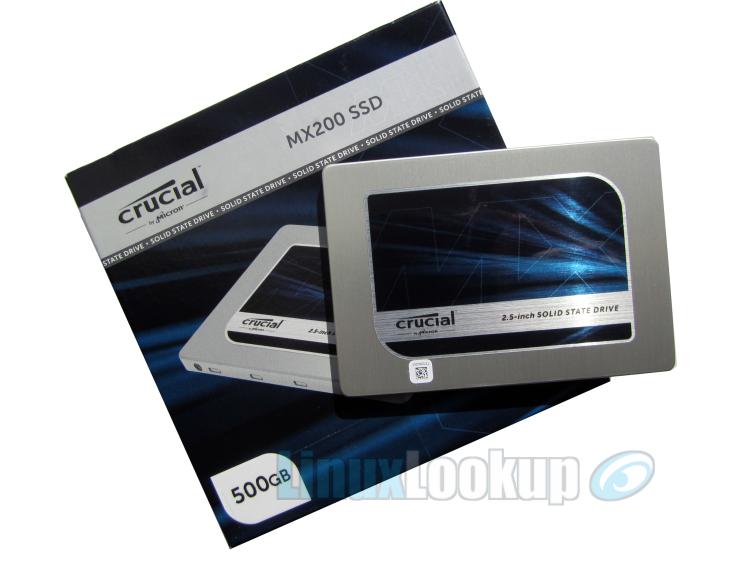Crucial MX200 500GB SSD Review
The Crucial MX200 is a contemporary Solid State Drive (SSD) targeted toward value-oriented consumers who want the benefits of flash storage without a big price tag. In this review we're going to take a look at Crucial's latest offering, the Crucial MX200 500GB SSD.
The Crucial MX200 SSD
The Crucial MX200 SSD is available in three different capacities, 250GB, 500GB and a larger 1TB model — retailing for $102.99, $194.99 and $379.99 respectively. This series also offers a variety of different form-factors such as SATA 2.5″ (7mm to 9mm spacer), mSATA and M.2 Type 2260/2280.
Unlike the preceding Crucial MX100 Review which had varying levels of sequential write performance based on storage size. All three capacities in the Crucial MX200 series are quoted to deliver 555MB/s sequential reads with 100,000 IOPS and sequential write performance up to 500MB/s with 87,000 IOPS.
Internally the MX200 preserves the same Marvell 88SS9189 controller we saw in the previous generation MX100 and again pairs with Micron's 16 nanometre (nm) MLC NAND flash. This combination delivers favorable performance and offers some great advanced feature sets, but doesn't offer any significant performance improvements in comparison. The biggest change is an addition of Dynamic Write Acceleration (DWA) which uses an "adaptable pool of high speed" single-level cell flash memory to help bump sequential write performance on 2.5" 250GB, 250GB & 500GB mSATA and M.2 drive models.
Like most current day Solid State Drives, this particular model (CT500MX200SSD1) utilizes the smaller 7mm z-height 2.5” form-factor to ensure compatibility with everything from Ultrabooks to Personal Computers — assuming your PC chassis has a 2.5" SSD mounting bracket, if not a 3rd party adapter can be purchased.
Some note worthy features included are on-board capacitors providing power-loss protection, enabling preservation of data if the power is interrupted. Whilst the drive is designed to operate from 0C to 70C, Adaptive Thermal Protection intelligently adjusts NAND operations if internal temperature begins to reach the maximum specification and does so until returning to an acceptable level. Hardware support for AES 256-bit encryption is present, along with a safeguard against data loss from physical flash memory failures with RAID like redundancy technology called RAIN (Redundant Array of Independent NAND). All features once previously reserved for expensive enterprise class Solid State Drives are standard on Crucial's MX200.
Crucial products have an outstanding track record for reliability and their entire Solid State Drive lineup is backed by a three-year limited warranty. MX200 500GB has a calculated arithmetic mean (average) time between failure of 160TB. This equals 87GB of writes per day for 5 years, nearly doubling the endurance rating of the previous generation MX100 512GB model and exceptionally high in comparison to other SSD's currently on the market.
Features
Highlight summary:
- Hardware-based AES-256 encryption
- Redundant Array of Independent NAND (RAIN)
- Adaptive Thermal Protection
- Exclusive Data Defense
- Power Loss Protection
- SATA 6Gb/s interface (3Gb/s backward compatible)
- Three-year limited warranty
- Free shipping (Like all Crucial products)
Specifications
- Type: 2.5-inch
- Height: 7mm (z-height with 9.5mm spacer)
- Flash Controller: Marvell 88SS9189
- Flash Type: Micron 16nm MLC NAND
- Serial ATA: Transfer rate 6Gb/s (backwards compatible with 3Gb/s)
- Temperature: Operating (0°C to 70°C) Non-operating (-40°C to 85°C)
- Acoustics: 0dB
- Mean Time Between Failures: >1.5 million hours
- Drive Endurance: 160TB=87GB per day for 5 years
Performance
Performance testing was done under Ubuntu 14.04 LTS (Trusty Tahr) using an ext4 file system. Your performance may vary. Factors affecting performance include: The file system used (e.g. ext2, ext3, etx4, jfs, reiserfs, Btrfs, xfs) and SATA interface (6Gb/s vs 3Gb/s).
Test System
- Processor: Intel Core i7-4790 @ 3.60GHz (8 Cores)
- Motherboard: ASUS Z87-PRO
- Chipset: Intel 4th Generation
- Memory: 32768MB (32GB)
- Disk: 500GB Crucial_CT500MX200
- Graphics: On-board Intel HD 4600 3072MB
- OS: Ubuntu 14.04
- Kernel: 3.13.0-61-generic (x86_64)
- File-System: ext4
- Interface: SATA 6Gb/s
Dbench is a filesystem benchmark that generates load patterns similar to those of the commercial Netbench benchmark, but without requiring a lab of Windows load generators to run. It is now considered a de-facto standard for generating load on the Linux VFS. Here we simulate the load of 1 client.
CompileBench tries to age a filesystem by simulating some of the disk IO common in creating, compiling, patching, stating and reading kernel trees. It indirectly measures how well filesystems can maintain directory locality as the disk fills up and directories age.
This test measures how long it takes to extract the .tar.bz2 Linux kernel package.
Flexible IO Tester (FIO) is a workload simulation tool. The graph above shows an Intel IOMeter File Server Access Pattern test which performs a mix of random and sequential IO and read/write workloads. User-defined variables such as the transfer request size, the percentage of random requests compared to sequential requests, and the read/write distribution to mimic the realistic usage. Performance is determined by the number of seconds it takes to complete the test.
IOzone was used to measure Linux filesystem read performance.
IOzone was also used to measure Linux filesystem write performance.
Gallery
Conclusion
The Good - Pros- Exceptional endurance rating
- Good peek performance
- Reasonable price point
- Variety of premium features
The Bad - Cons
- Benchmark performance is lower than the MX100
The Ugly - Issues
- N/A
The Verdict - Opinion
There is no denying the glaring similarity between Crucial's new MX200 and the previous generation MX100. However, with Dynamic Write Acceleration on lower-capacity versions, double the endurance rating (reliability) and lower price tag, the MX200 is an attractive purchase despite conservative performance.












